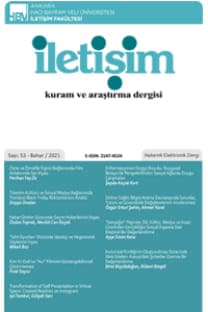Lefebvre ve modern dünyada gündelik hayat
Henri Lefebvre’e göre gündelik hayatın keşfi, en yalın biçimde ifade etmek gerekirse, modern dünyada bürokratik denetimin gelişiminin bir sonucudur. Buna göre, söz konusu bürokratik denetim, modern gündelik hayatın tarihini üç kısma ayırarak incelemeye olanak sunar: üsluplar, üslupların sonu ve kültürün başlangıcı (19. yüzyıl) ile gündelik hayatın yerleşmesi ve sağlamlaştırılması. Lefebvre’in gündelik hayatın gitgide önem kazanarak tüm devrim biçimlerinin yerini almaya başlamasını izah etmekte kullandığı başlıca argümanı ise, 20. yüzyılın düşünce ufk unda yeni bir “evrimci praksis”in doğuşudur. Bu tarihten sonra artık, her türlü devrimci praksise yüklenen başarısızlık, gündelik hayatın yeni bir mücadele alanı olarak belirişine katkıda bulunacaktır. Bu perspektift en bakıldığında, siyasal düşüncelerin yerini, artık gündelik yaşamda üslupların ve hayat tarzlarının savaşı almıştır ve bu savaş, sistemin bürokratik eliyle yeniden düzenlenmeye, örgütlenmeye muhtaçtır. Bu sonuncu evrede bile sistem, büsbütün sınıfsal çelişkilerinden arınmış değildir. Aksine, resmi meşruiyeti arzu ve gereksinimlerin “tatmin”ine ve söz konusu tatmin duygusunun körüklediği kışkırtılmışlıkla yeniden arzu duymaya dayalı olan tüketim toplumunda arzu ettiklerine denk bir maddi tatmin sağlayamayan “tatminsiz” kitlelerin yaşadığı yoksunluk tüm şiddetiyle varlığını sürdürmektedir. Bu makalede, kısaca, kentin ve toplumsal ilişkilerin yeniden üretimi ve dönüşümü bağlamında çözümlenmeye çalışılan gündelik hayat kavramı, modernizm ve gündelikliğin politikası, “evrimci praksis” ve günümüz tüketim kültürü kavşağında aldığı farklı biçimler bağlamında analiz edilmektedir.
Lefebvre and everday life in the modern world
According to Lefebvre, the discovery of everyday life, in simple terms, is the result of the development of bureaucratic auditing in modern world. For this, the bureaucratic auditing may lead to examine the history of modern everyday life in three phases: styles, the end of styles, the beginning of culture (19. Century), and setting and strengthening of everyday life. Th e main means of evidence that Lefebvre use to explain the growing importance and so the beginning of the substitution of it with all the revolution types is the raising of “revolutionist praxis” in the directions of 20. Century thought. Aft er this date, all the types of revolutionists will contribute to the appearing of unsuccessfulness that attributed to the praxis as a new arena in everyday life. When considered through this perspective, anymore, the war of styles and life styles in everyday life has taken the place of political thought, this sort of war need to be reevaluated and reorganized by the bureaucracy of the established system. So, this system is not purified from the whole class paradoxes. In contrast, formal legitimating, which is as if it depends on “satisfaction” of desires and requirements, and also priming provocation this questioned satisfaction to re-desire in consumption society, exists with a sharp deprivation in the “dissatisfied” communities which could not find an equal material satisfaction. In this paper, briefl y, the concept everyday life that is tried to analyzed in the context reproducing and reformation of social relations, modernism and everyday life politics, “revolutionist praxis”, and their diff erent forms in the raising of today’s consumption culture.
___
- Bourdieu, P (1979). La Distinction: Critique social du jugement. Paris: Éditions de Minuit.
- Bourdıeu, P Ve Wacquant, D.J. L. (2003). Düşünümsel Bir Antropoloji İçin Cevaplar, Çev: Nazlı Ökten,İstanbul: İletişim Yayınları.
- Canbaz, Ş (1999). “Bir Tüketim Olgusu Olarak Moda ve Giysi”, Gazi Üniversitesi İletişim Fakültesi Dergisi,Kış, 99/1: 25–39.
- Carassus, G (2008). “Autour d’Henri Lefebvre: Critique de la vie quotidienne”, http://www.gabrielperi.fr/ Critique-de-la-vie-quotidienne, (erişim: 24.10.2008).
- Enrique, A.& Passın, C (2002). “La quotidienneté comme objet: Henri Lefebvre et Maff esoli: Deux Lectures opposées”, Société, No: 78, 4.
- Fiske, J (1999). Popüler Kültürü Anlamak, Çev: Süleyman İrvan, Ankara: Bilim ve Sanat Yayınları.
- Guigou, J (2008). “La société du capital illimité”, http://www.recherche.univ.montp3.fr, (erişim: 02.07.2008).
- Lefebvre, H (1958). Critique de la vie quotidienne. Vol: I, Paris: L’Arche.
- Lefebvre, H (1981). Critique de la vie quotidienne. Vol: III, Paris: L’Arche.
- Lefebvre, H (1998). Modern Dünyada Gündelik Hayat, Çev: Işın Gürbüz, İstanbul: Metis Yayınları.
- Nicklas, H (2008). “Du quotidien, des préjuges et de l’apprentissage interculturel”, http://www. ofaj. org/paed/ texte/duquotidien/duquotidien4.html. (erişim: 22.10.2008).
- Paquot, T (2006). “Consommer pour se consommer”, Le Magazine littéraire, Juillet- Août.
- Tsukahara, F (2006). “Mai 68 et la société de consommation- Regards sur Baudrillard et Yoshimoto”, A la maison Franco-japonaise, 8 Avril.
- Yayın Aralığı: Yılda 4 Sayı
- Başlangıç: 1983
- Yayıncı: Ankara Hacı Bayram Veli Üniversitesi İletişim Fakültesi
Sayıdaki Diğer Makaleler
Popüler kültürde hegemonik anlamların üretilmesinde gençlik altkültürlerinin önemi
Lefebvre ve modern dünyada gündelik hayat
Sefaletin psikolojisi yada psikolojinin sefaleti : Psikolojik yoksulluk yaklaşımlarının eleştirisi
Gündelik yaşamın üretimi ve reklamlar
'' Sosyal gruplar, örgütler ve kuramlar ''
Büyüklere masallar : Fantastik filmler ve gündelik yaşamda büyünün yeniden keşfi
Yeni piyasa toplumu ve değişen gündelik hayat
